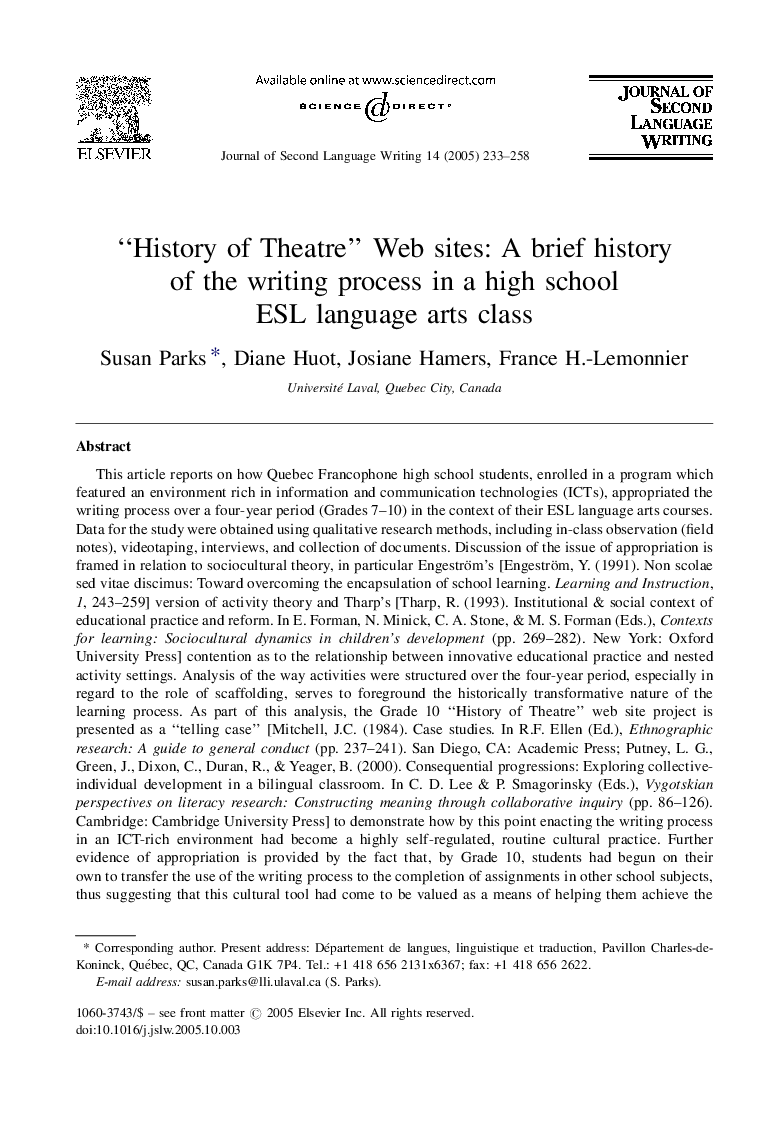| Article ID | Journal | Published Year | Pages | File Type |
|---|---|---|---|---|
| 10315460 | Journal of Second Language Writing | 2005 | 26 Pages |
Abstract
This article reports on how Quebec Francophone high school students, enrolled in a program which featured an environment rich in information and communication technologies (ICTs), appropriated the writing process over a four-year period (Grades 7-10) in the context of their ESL language arts courses. Data for the study were obtained using qualitative research methods, including in-class observation (field notes), videotaping, interviews, and collection of documents. Discussion of the issue of appropriation is framed in relation to sociocultural theory, in particular Engeström's [Engeström, Y. (1991). Non scolae sed vitae discimus: Toward overcoming the encapsulation of school learning. Learning and Instruction, 1, 243-259] version of activity theory and Tharp's [Tharp, R. (1993). Institutional & social context of educational practice and reform. In E. Forman, N. Minick, C. A. Stone, & M. S. Forman (Eds.), Contexts for learning: Sociocultural dynamics in children's development (pp. 269-282). New York: Oxford University Press] contention as to the relationship between innovative educational practice and nested activity settings. Analysis of the way activities were structured over the four-year period, especially in regard to the role of scaffolding, serves to foreground the historically transformative nature of the learning process. As part of this analysis, the Grade 10 “History of Theatre” web site project is presented as a “telling case” [Mitchell, J.C. (1984). Case studies. In R.F. Ellen (Ed.), Ethnographic research: A guide to general conduct (pp. 237-241). San Diego, CA: Academic Press; Putney, L. G., Green, J., Dixon, C., Duran, R., & Yeager, B. (2000). Consequential progressions: Exploring collective-individual development in a bilingual classroom. In C. D. Lee & P. Smagorinsky (Eds.), Vygotskian perspectives on literacy research: Constructing meaning through collaborative inquiry (pp. 86-126). Cambridge: Cambridge University Press] to demonstrate how by this point enacting the writing process in an ICT-rich environment had become a highly self-regulated, routine cultural practice. Further evidence of appropriation is provided by the fact that, by Grade 10, students had begun on their own to transfer the use of the writing process to the completion of assignments in other school subjects, thus suggesting that this cultural tool had come to be valued as a means of helping them achieve the personal goal of producing a better written product and not merely fulfill a course requirement. The teacher's proleptic stance in terms of the way he viewed this developmental process is also discussed.
Keywords
Related Topics
Social Sciences and Humanities
Arts and Humanities
Language and Linguistics
Authors
Susan Parks, Diane Huot, Josiane Hamers, France H.-Lemonnier,
